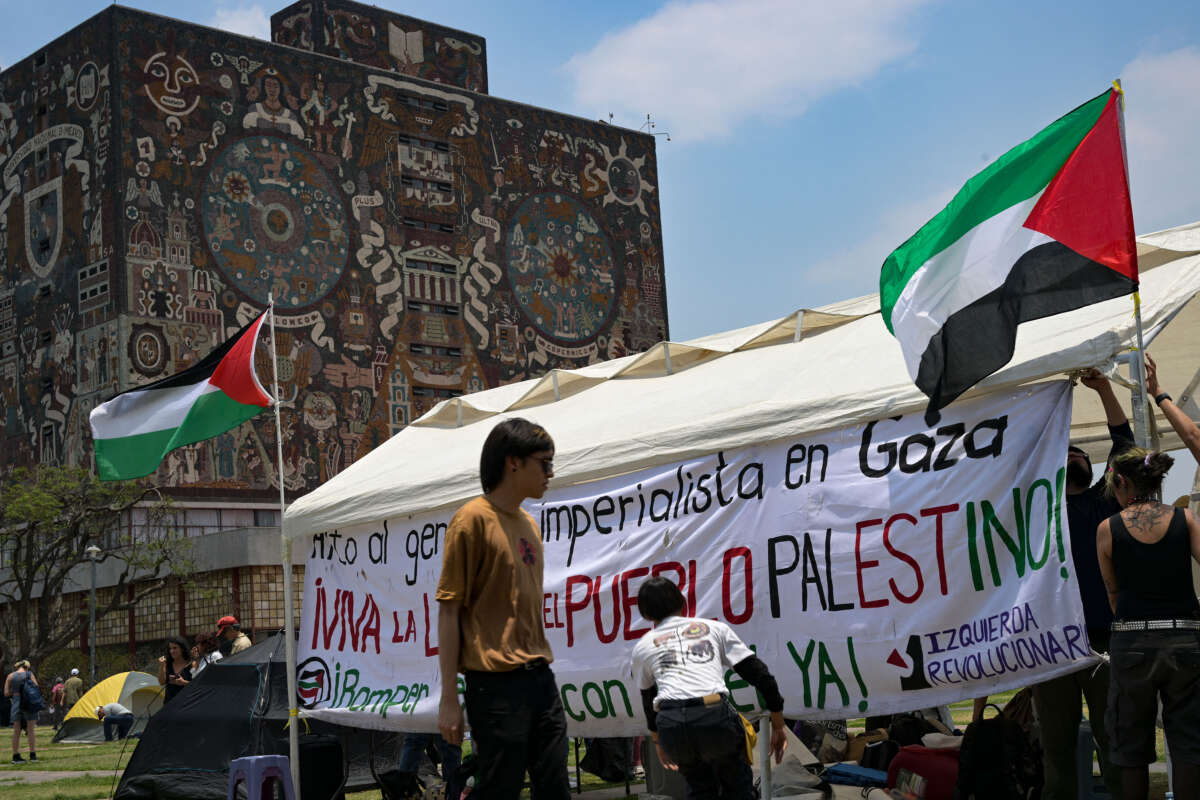Part of the Series
Struggle and Solidarity: Writing Toward Palestinian Liberation
Adorning the exterior walls of the National Autonomous University of Mexico’s (UNAM) Rectory Tower are three murals by famed Mexican artist David Alfaro Siqueiros, each with an explicit political message. The mural on the north-facing wall, called Dates in Mexican History or the Right for Culture, features two intertwined arms reaching out toward an open book with five years painted inside representing key moments in Mexican history: 1520 (the arrival of the Spanish); 1810 (the start of the Mexican independence struggle); 1857 (the promulgation of the country’s liberal constitution); 1910 (the start of the Mexican Revolution); and 19??.
Siqueiros, an avowed communist, left the last date open ended to symbolize a future, as-of-yet-unknown date of social upheaval and change. It is here at this site where students from the Interuniversity and Popular Assembly in Solidarity with Palestine opted to set up their encampment on Thursday to protest the ongoing genocide in Gaza.
The Rectory Tower houses the offices of the university president and administration and lies at the heart of the university’s Ciudad Universitaria, a sprawling campus declared a UNESCO World Heritage Site. Like the many students in the United States who have established encampments in central locations at dozens of university campuses throughout the country, the aim of Mexican students in setting up their camp here is to visibly send a message to the university leadership and exert pressure for their demands to be met.
The decision to erect the protest camp was made in a democratic assembly earlier in the week by the Interuniversity and Popular Assembly in Solidarity with the People of Palestine, which brings together various students and activists from throughout Mexico City. Likewise, their demands were established through the democratic assembly process.
Organizers with the Interuniversity and Popular Assembly in Solidarity with the People of Palestine say they intend to maintain the camp indefinitely, with educational and cultural activities taking place throughout.
In addition to calling for an end to the occupation and the genocide being carried out against the Palestinian people in Gaza, the students are calling on the Mexican government to break diplomatic relations with Israel and for UNAM to break all academic ties with Israeli institutions. The students are also explicitly calling for an end to the repression being carried out by police and university administrators in France and the United States.
While the Mexican students have certainly been influenced by students in the U.S., they also draw inspiration from their own history.
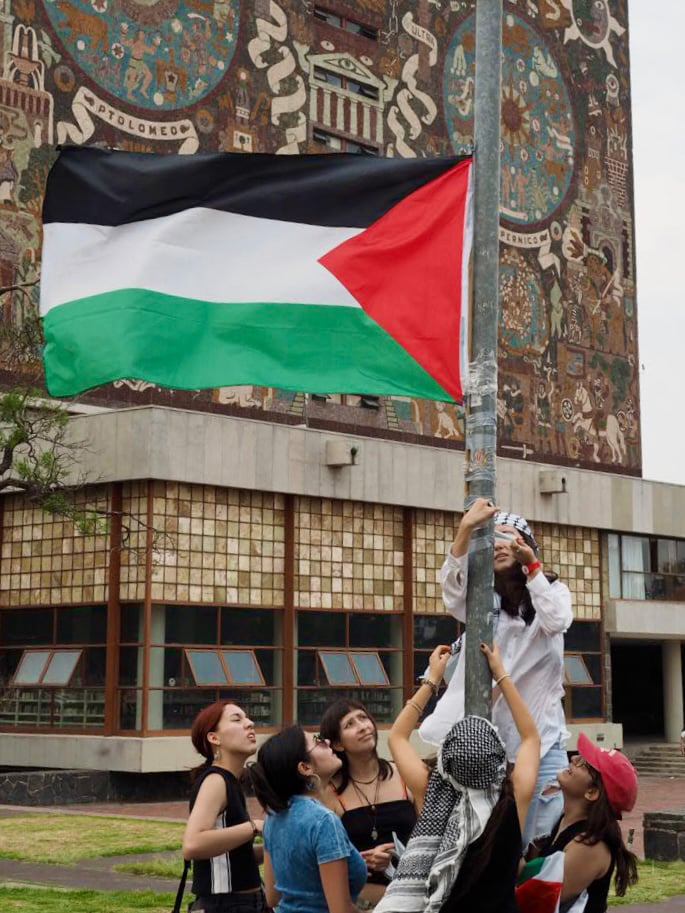
“I think it is 50/50. We are fully supporting the people from universities in the United States who have been repressed. UNAM also has a long history of student uprisings and protests. That’s what brings us here today,” Natalia Valentina, a student at UNAM and a volunteer organizer at the camp, told Truthout.
In fact, in Mexico’s recent history, students have literally filled out the question marks in Siqueiros’s The Right to Culture. In 1968 Mexican students joined the wave of global student uprisings against imperialist aggression and social exclusion, fulfilling the muralist’s prophecy and inscribing the year on the tower’s wall. The dates were filled in again in 1999, when Mexican students went on strike and used tactics such as occupations to successfully defeat an effort to introduce tuition fees despite being subjected to the type of brutal repression that students in the U.S. today are facing.
Students say they are participating in this protest in part out of a sense of obligation to that history but also because they feel that they can push the Mexican government to go further.
President Andrés Manuel López Obrador, who was elected in 2018 and is Mexico’s first leftist president in decades, has condemned Israel’s violence, called for an immediate ceasefire, and joined Chile in referring the situation in Palestine to the International Criminal Court, but has stopped short of breaking diplomatic relations with Israel as Colombia has done.
Valentina describes López Obrador’s response as “tepid” and casts the Mexican government’s response as insufficient given the level of brutality Israel has employed.
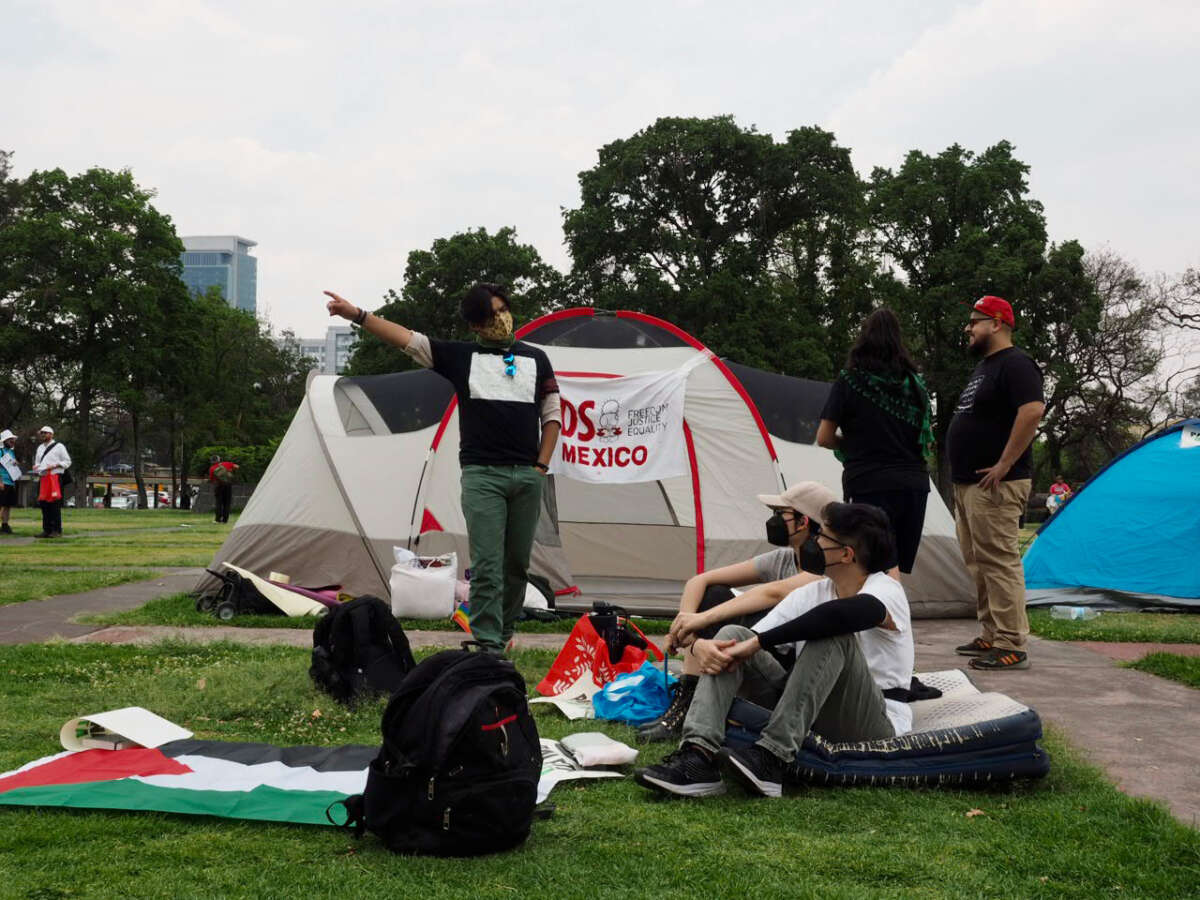
“If we are not doing anything, if we are not saying anything, then we are on Israel’s side. So I think the Mexican government should speak out against Israel’s actions against Palestine and take action to stop the violence,” Valentina told Truthout.
“We have to rise up,” she concluded.
Hind Obaida, a young woman from Gaza who lives in the U.S. but is currently visiting Mexico, told Truthout that she has lost many family members, while survivors have seen their homes leveled and have been forced to move constantly just to live another day. She says these protest actions and messages of solidarity are reaching people in Gaza and giving them hope.
“It’s incredible just being at this university and understanding the history of this university and how people just kind of get it. … People are fighting, they are not giving up and it is inspiring to see people camping out and fighting against the oppressive powers in my family’s name,” said Obaida, who used a pseudonym to protect her family in Gaza.
Obaida herself put up a tent, a keffiyeh wrapped around her shoulders as she built it. She expressed pride talking about how the students she met made explicit links between liberation struggles.
“Everyone has a stake in this movement, this is for global liberation, it’s one thing to stand in solidarity with an oppressed people, but it’s another to understand how we’re all linked together,” Obaida told Truthout.
Cognizant of the widespread criticism of the crackdown by university administrators in the U.S., the UNAM administrators have proceeded cautiously.
University administrators made no effort to prevent the encampment from being established and issued a carefully worded statement claiming they would be “respectful” of the protest “as long as these are conducted within the limits of respect for the rights of the other members of our community.” Students nonetheless took umbrage at the suggestion that those participating in the protest would infringe on the rights of others or engage in any discrimination, rejecting any effort to label their struggle as antisemitic as has disingenuously been done with students elsewhere in the world.
Israeli Complicity in Mexican Violence
After most of the tents were erected, students turned to other tasks: Some organizers gave interviews to various news outlets onsite, while others made signs or helped new arrivals establish themselves. Near the main tent, a group of female students gathered around a light pole to hang the flag of Palestine in front of UNAM’s Central Library, itself decorated with a massive mural by Juan O’Gorman, another of Mexico’s famous muralists.
A short distance away, activists with the Boycott, Divestment, Sanctions (BDS) campaign affiliate in Mexico set up their tent. The BDS campaign is an initiative of Palestinian civil society to pressure Israel via peaceful means to end the occupation of Palestinian territories and in the current context, bring about a ceasefire and an end to the genocide.
BDS activist Paulina Castro told Truthout that in Mexico, the campaign is specifically calling for a boycott of the tech company HP and CEMEX, a Mexican-based cement company deeply involved in the oppression of Palestinians through its work building Israel’s “separation barrier” and checkpoints limiting the mobility of Palestinians. The BDS campaign in Mexico also backs students’ calls for an academic boycott of Israel and for the Mexican government to break relations with Israel.
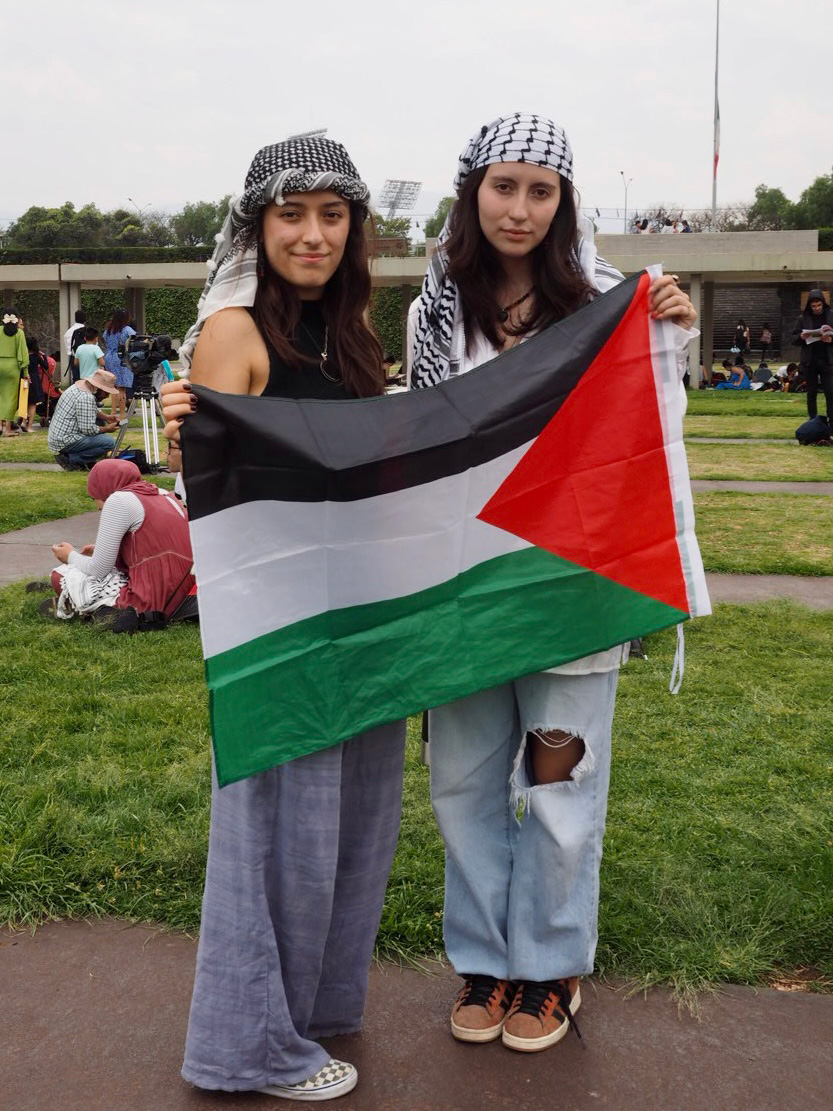
In the case of Mexico, the demand to break diplomatic relations with Israel would have major reverberations due to Israel’s insidious role in Mexico’s domestic politics. In March 2011, Mexico reached an agreement to become the first client of notorious Israeli-made spying software Pegasus, eventually becoming the most prolific user in the world. Purportedly created to fight organized crime, the software, which infiltrates phones without the user’s knowledge, has been used by governments throughout the world to spy on civilians. In the case of Mexico, it was used to spy on human rights defenders and activists. Although López Obrador suspended its use, it is believed the Mexican Armed Forces continue to use the software.
Castro says organizers with the BDS campaign suspect they have been the victims of spying — detecting abnormal behavior in their phones — after engaging in protest actions at the Israeli Embassy in Mexico City. A break with diplomatic and economic relations would spell an end to the partnerships that allow this software to be used in Mexico.
“We know that there are many interests at stake, that there is a lot of money involved, and that the exchange of technology is also in play. In the end, Israel is this seller both of weapons and occupation technology to the entire world,” said Castro.
The BDS activist also points to Israel’s role in obstructing justice in the case of the 43 forcibly disappeared students from the teacher training college in Ayotzinapa, Escuela Normal Rural Raúl Isidro Burgos, in 2014. Israel is currently sheltering Tomás Zerón, who was then head of the Federal Prosecutor’s Criminal Investigation Agency, which is believed to have led the state cover-up of the students’ forced disappearance. Mexico has sought Zerón’s extradition from Israel but has faced legal and diplomatic roadblocks due to the lack of an extradition treaty between the two countries and Israel’s displeasure with the López Obrador government’s position on Palestine. Mexico fully recognized the State of Palestine in 2023.
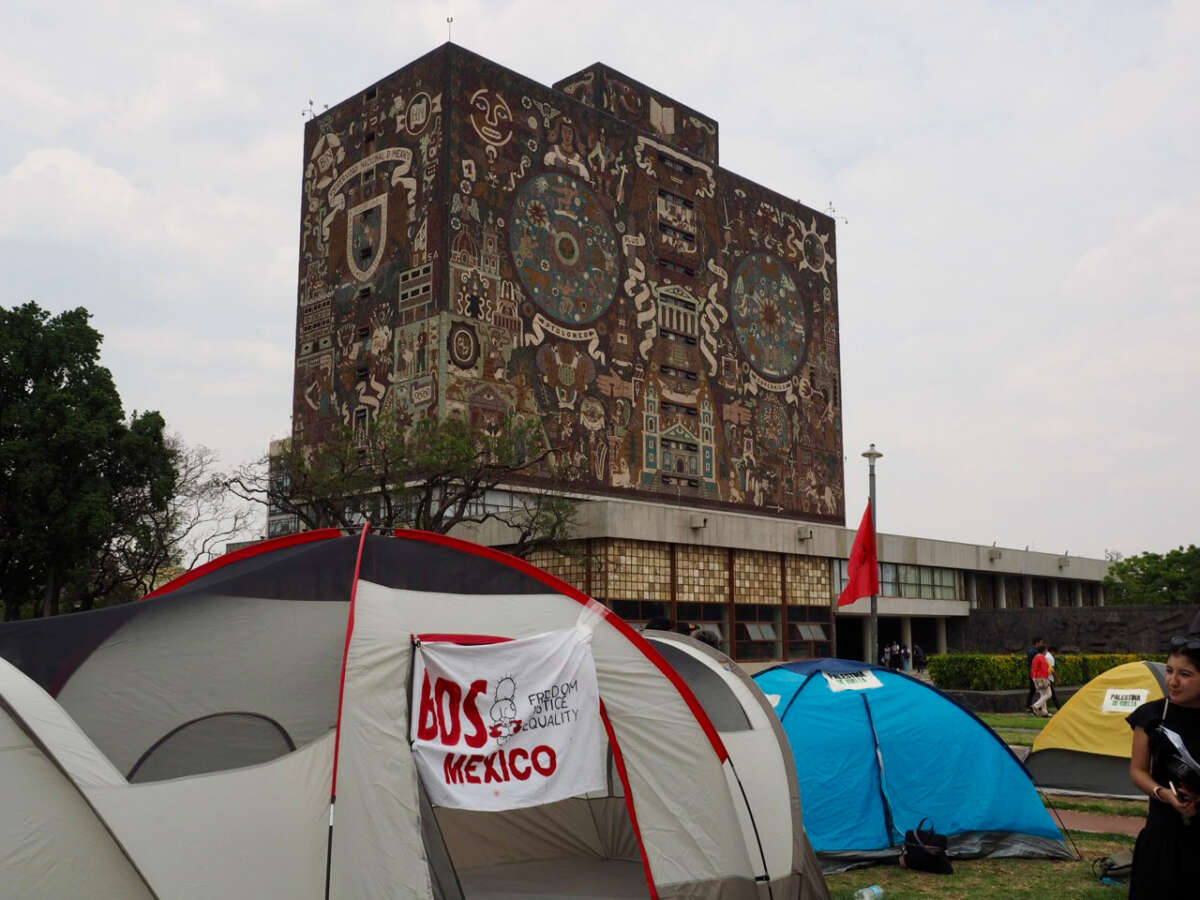
Castro also criticized the decision by politicians in Mexico to continue to send police and security forces to train in Israel, a common practice throughout the world. In a report for Migrant Roots Media, Cristian Padilla Romero laid out the long history of Israeli support for repressive regimes throughout Central America.
In light of the international dimension of the Palestinian liberation struggle, the camp at the UNAM has itself become a place of convergence for transnational, cross-border solidarity.
Tia Wong and Ryan Parsons, two students from Ontario, Canada, who learned of the encampment while visiting Mexico, decided to drop by the camp and deliver a message of solidarity, calling on the students in Mexico to remain steadfast.
“I think seeing the same kind of language being used around anti-imperialism, anti-occupation, goes to show that this is an issue that connects everyone and that there is a way forward that we can all understand and strive toward,” said Wong.
“There is certainly language around a shared struggle, both in terms of shared enemies and shared goals — language of communism and collective liberation as well. We’re not only targeting the United States as the bastion of white supremacy and global imperialism, but also in general targeting global capital, targeting imperialist forces as a whole, as a collective goal,” Parsons told Truthout.
“We’re not ending at fighting the United States,” he added. “We’re not ending until the collective struggle ends with collective liberation.”
